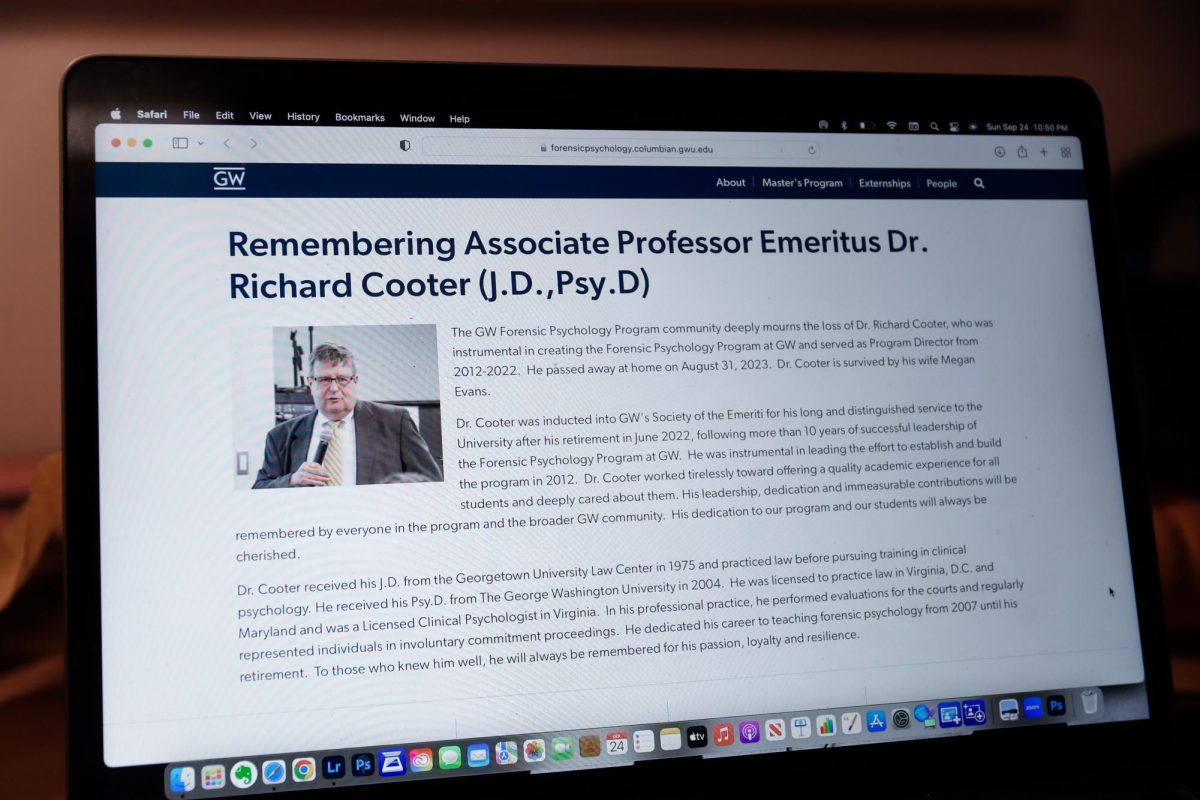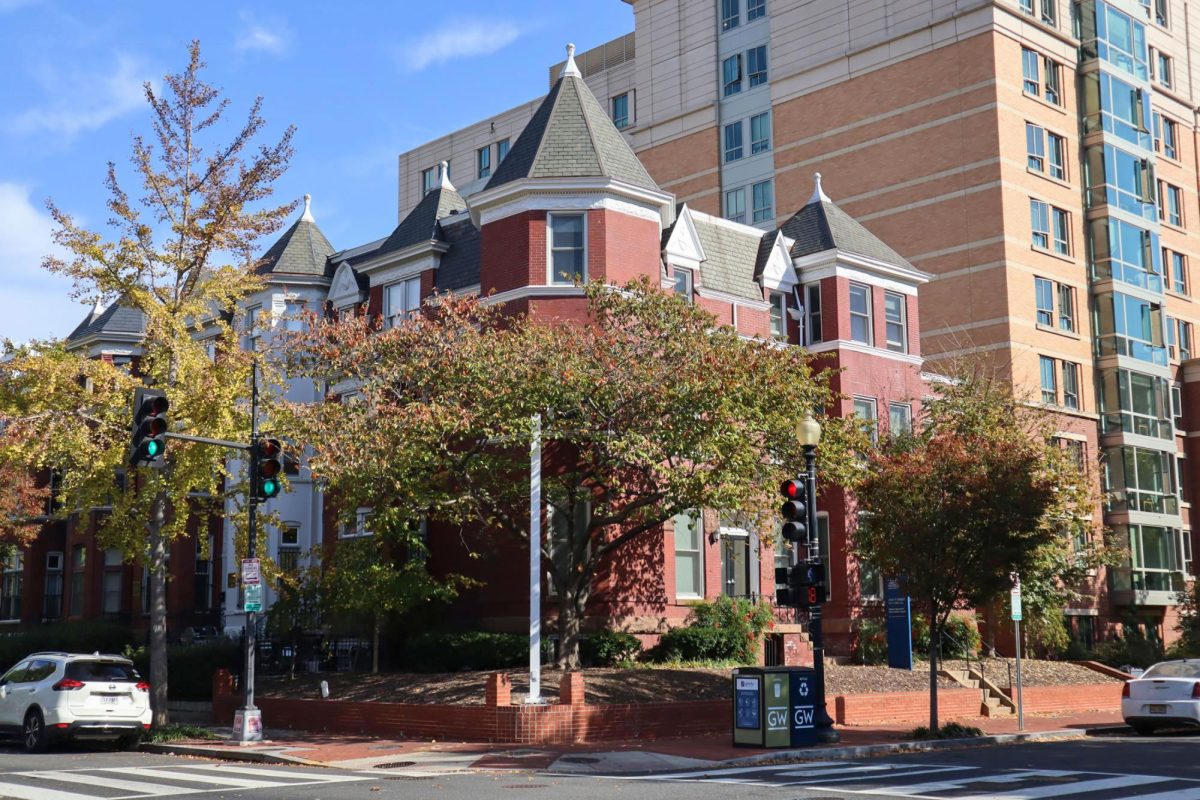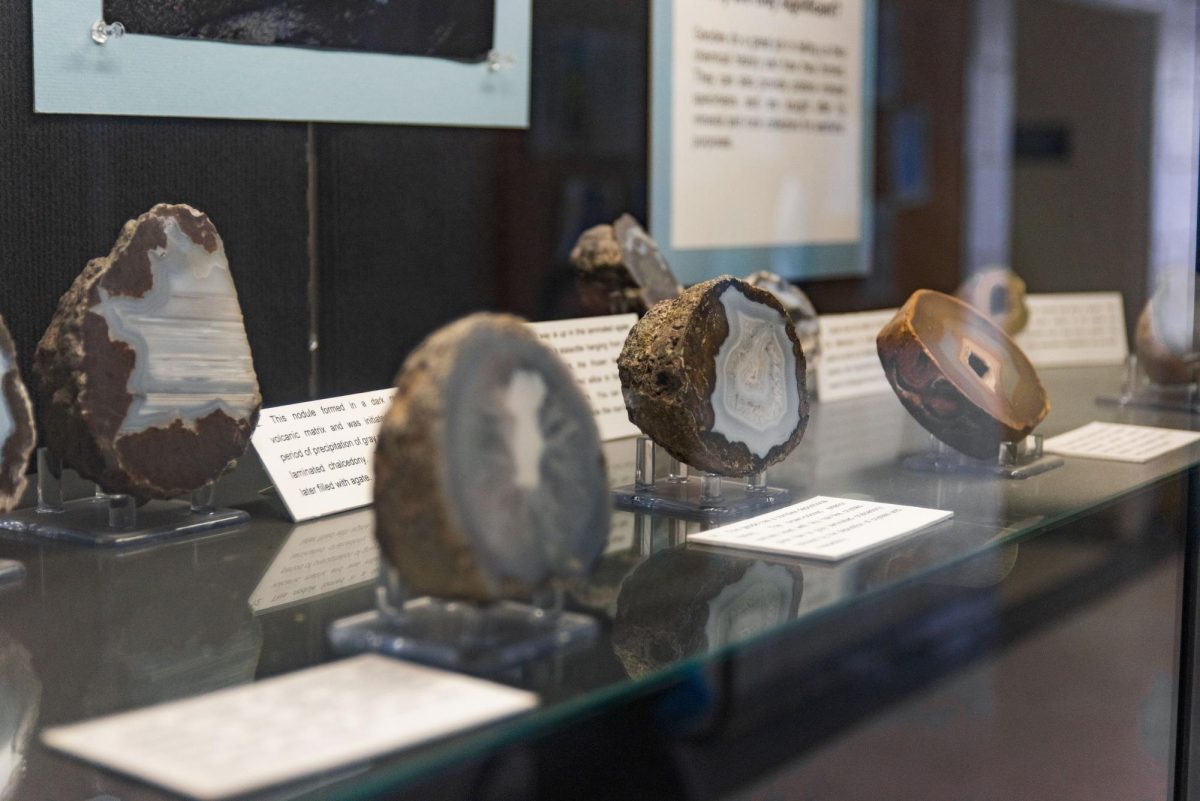Richard “Dick” Cooter, an associate professor emeritus and the co-developer and former director of GW’s forensic psychology masters program, died from cancer last month. He was 75.
Cooter received a doctorate of psychology from GW in 2004 before returning to the University in 2012 to co-launch the forensic psychology master’s program, an initiative that studies legal questions using social and cultural lenses. His colleagues and students described him as a dedicated and brilliant advocate for justice.
“Anybody who knew him was struck by just how genuine and funny and honest he was,” said Rocio Lopez-Sharifi, the director of graduate studies and Cooter’s co-developer of the forensic psychology program.
Cooter started teaching forensic psychology in 2007 at a branch of Argosy University and left in 2012 to launch GW’s Master of Arts in Forensic Psychology program. He served as the program director until he retired in June 2022 and joined the Society of the Emeriti, a network of retired faculty that organizes events like luncheons to maintain contact with each other and the University.
Lopez-Sharifi said after meeting Cooter while teaching at another university, she and Cooter pitched the master’s program at GW because they both received their doctorate degrees from GW and knew what resources it could provide to faculty and students. She said Cooter “worked tirelessly” toward his goal of providing students with a quality education.
“He was a wonderful partner, every step of the way,” Lopez-Sharifi said. “He was tireless, he was dedicated and he was so passionate about bringing about a quality and student-centered master’s program to GW.”
Lopez-Sharifi said his colleagues and students knew he was “highly dedicated” to providing students with all the support and resources they needed to learn. She said he frequently spoke with students to offer help and make sure they received all the education needed to pursue a career in forensic psychology at the end of the program.
“So much of his life in the last 10 years was all about making sure that the program was where he thought it needed to be and what it needed to bring to the students,” Lopez-Sharifi said.
Annette Allgood, the retired director of GW’s Arlington and Alexandria Graduate Education Centers, helped Lopez-Sharifi and Cooter figure out some of the administrative aspects of setting up the master’s program, which is taught at the Alexandria center, and said the students he taught were his “complete and total focus.”
“Dick Cooter was simply a force of nature,” Allgood wrote in a statement. “A truly great man. He was tireless in his student advocacy. He was brilliant. Honest. Humble. Hilarious.”
Allgood said Cooter came from “humble beginnings” and achieved everything in his professional life through hard work and ambition. She said the two of them frequently spoke about law and ethics and personal topics like his love for his family.
“He often spoke of mistakes he had made,” Allgood said. “Changes to his thinking and his passions. Debts he felt he needed to repay. Dick was his own biggest critic, and it genuinely mattered to him to make things right.”
Cooter was born in Syracuse, New York, on Aug. 28, 1948, where he grew up with his twin brother. He received a bachelor’s degree at the State University of New York at Fredonia and worked full time as the youngest chief of labor relations for the Federal Bureau of Prisons while studying for his law degree from Georgetown University, which he earned in 1975.
After graduating from law school, Cooter worked in private practice law with licenses to practice in D.C., Virginia and Maryland for roughly 30 years before returning to school for his doctorate degree. He completed the Clinical Psychology Program at GW in 2004 and started a career as a clinical psychologist in Virginia where he worked as a nursing home consultant and therapist, a clinician at the James Madison University Counseling Center and an emergency services clinician.
Cooter’s obituary states he was passionate about community safety, fair treatment of individuals with mental health issues and representing “vulnerable populations.” These interests led him to start working with mental health facilities, courts and police in southwest and central Virginia to provide evaluations and testimony in criminal trials after graduating from GW with his doctorate, his obituary states.
Loring J. Ingraham, a professor of clinical psychology and the director of the professional psychology program, taught Cooter when he was receiving his master’s degree in clinical psychology and said his previous law experience allowed him to bring lots of first-hand knowledge to the classroom.
“It really started out as a student-faculty relationship and then we became colleagues and he really supported me in our program,” Ingraham said. “He was someone I could bounce ideas off of and would give me good advice and likewise when he had questions I’d always consult. We really enjoyed each other’s company.”
Ingraham said Cooter was diagnosed with cancer toward the end of his teaching career but continued to prioritize his students despite surgeries and chemotherapy. He said Cooter felt attached to the program he developed and made sure he always had time to meet with faculty and students.
“He would say, ‘Well, I could put off this surgery later this semester, I can put off this treatment,’” Ingraham said. “He really cared about his students and really wanted to support them and be there for them.”
Kelsey Broccoletti, the administrator for the forensic psychology program and Cooter’s former student, said he was a “strong presence” who was committed to helping his students in any way he could. She said he was “such a force” even at the end of his career when he was sick, still frequently making time to meet with students.
“I would kind of describe him as a hard candy with a soft gooey center, you know what I mean?” Broccoletti said. “He was so strong and tough but he was such a secret softy. He really, really cared for all of his students.”
A funeral service was held for Cooter at the Flora Funeral Service and Cremation Center in Rocky Mount, Virginia. He is survived by his wife, Megan Evans, and his son, Joe.








